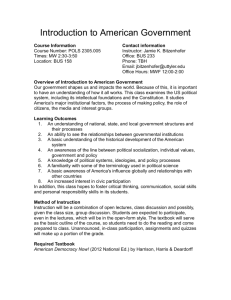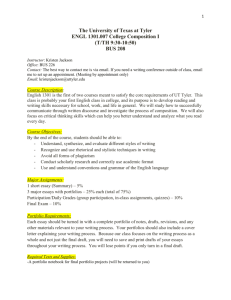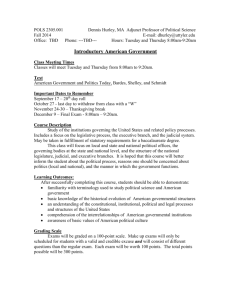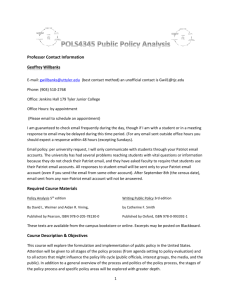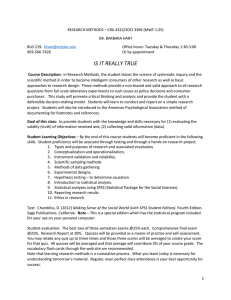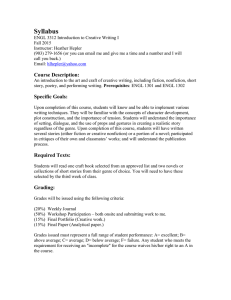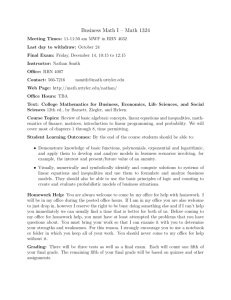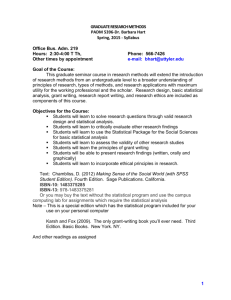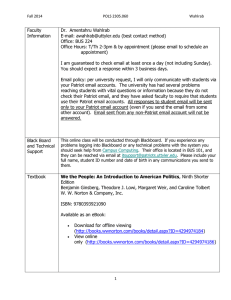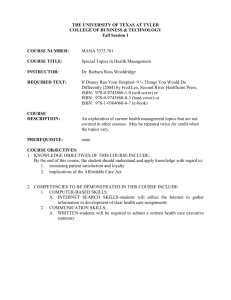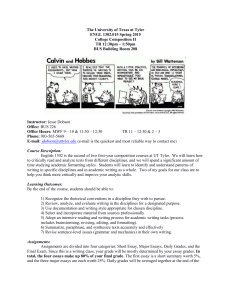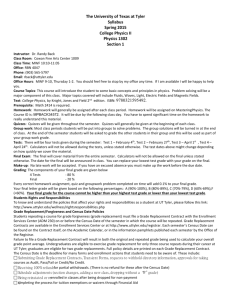ENGL 2322, English Literature to the 1780`s, Fall 2015
advertisement
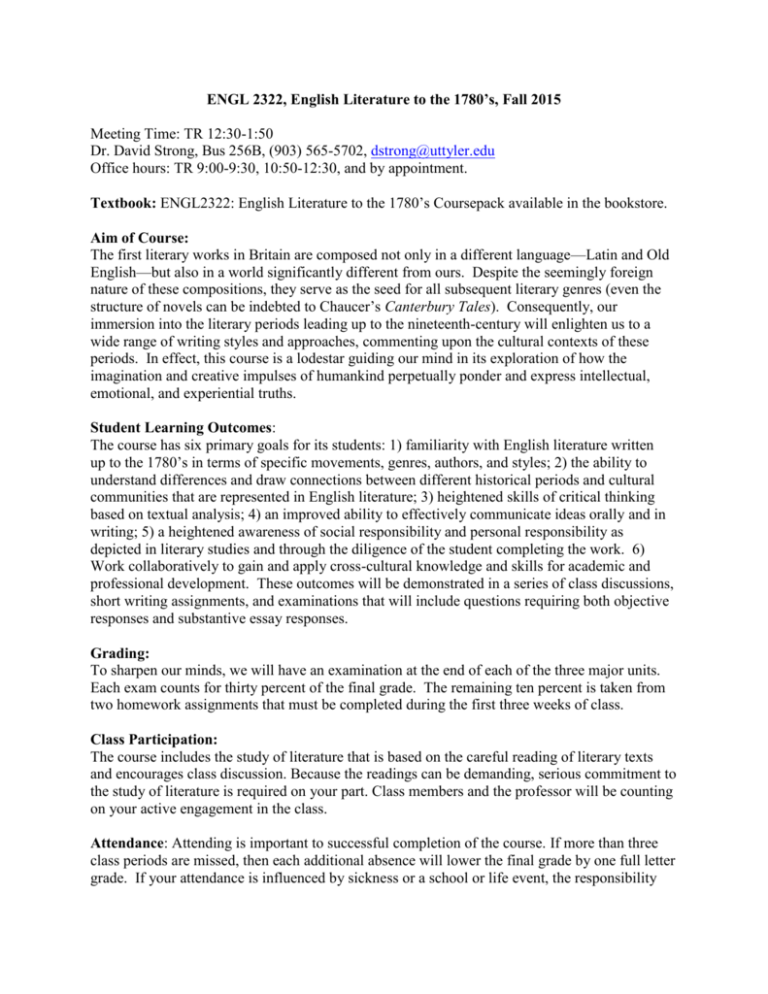
ENGL 2322, English Literature to the 1780’s, Fall 2015 Meeting Time: TR 12:30-1:50 Dr. David Strong, Bus 256B, (903) 565-5702, dstrong@uttyler.edu Office hours: TR 9:00-9:30, 10:50-12:30, and by appointment. Textbook: ENGL2322: English Literature to the 1780’s Coursepack available in the bookstore. Aim of Course: The first literary works in Britain are composed not only in a different language—Latin and Old English—but also in a world significantly different from ours. Despite the seemingly foreign nature of these compositions, they serve as the seed for all subsequent literary genres (even the structure of novels can be indebted to Chaucer’s Canterbury Tales). Consequently, our immersion into the literary periods leading up to the nineteenth-century will enlighten us to a wide range of writing styles and approaches, commenting upon the cultural contexts of these periods. In effect, this course is a lodestar guiding our mind in its exploration of how the imagination and creative impulses of humankind perpetually ponder and express intellectual, emotional, and experiential truths. Student Learning Outcomes: The course has six primary goals for its students: 1) familiarity with English literature written up to the 1780’s in terms of specific movements, genres, authors, and styles; 2) the ability to understand differences and draw connections between different historical periods and cultural communities that are represented in English literature; 3) heightened skills of critical thinking based on textual analysis; 4) an improved ability to effectively communicate ideas orally and in writing; 5) a heightened awareness of social responsibility and personal responsibility as depicted in literary studies and through the diligence of the student completing the work. 6) Work collaboratively to gain and apply cross-cultural knowledge and skills for academic and professional development. These outcomes will be demonstrated in a series of class discussions, short writing assignments, and examinations that will include questions requiring both objective responses and substantive essay responses. Grading: To sharpen our minds, we will have an examination at the end of each of the three major units. Each exam counts for thirty percent of the final grade. The remaining ten percent is taken from two homework assignments that must be completed during the first three weeks of class. Class Participation: The course includes the study of literature that is based on the careful reading of literary texts and encourages class discussion. Because the readings can be demanding, serious commitment to the study of literature is required on your part. Class members and the professor will be counting on your active engagement in the class. Attendance: Attending is important to successful completion of the course. If more than three class periods are missed, then each additional absence will lower the final grade by one full letter grade. If your attendance is influenced by sickness or a school or life event, the responsibility falls upon you to see that the professor receives an official excuse from doctor, dean, or coach. You must provide proof of your attendance at weddings, funerals, and other significant life events; your absence for these events will be excused at the professor’s discretion. Please note: a college education is meant to teach students to think outside of their own viewpoints—to expose them to multi-faceted ways of thinking and knowing. That is intellectual growth and exploration. A student will not be excused from class discussion or assignments simply because they do not agree with the text. Topics such as religion, sex, and politics are fundamental in literary studies and, thus, will be examined in detail. Course Expectations: Lectures are the intellectual property of the instructor and may not be recorded under any circumstance. No voice recorder, camera or any type of electronic device can be used unless documentation of a disability which requires such a device has been provided. Cell phones must be turned off and put away before class begins. Texting and talking on the phone is prohibited. According to the university’s policies on academic misconduct and non-academic misconduct, you will not engage in any academic misconduct in this course, including, but not limited to, plagiarism, use of unattributed sources, and cheating on exams. Any kind of cheating and/or plagiarism will result in my being turned into the student disciplinary committee and automatically failing the class. Students Rights and Responsibilities To know and understand the policies that affect your rights and responsibilities as a student at UT Tyler, please follow this link: http://www2.uttyler.edu/wellness/rightsresponsibilities.php Grade Replacement/Forgiveness and Census Date Policies Students repeating a course for grade forgiveness (grade replacement) must file a Grade Replacement Contract with the Enrollment Services Center (ADM 230) on or before the Census Date of the semester in which the course will be repeated. Grade Replacement Contracts are available in the Enrollment Services Center or at http://www.uttyler.edu/registrar. Each semester’s Census Date can be found on the Contract itself, on the Academic Calendar, or in the information pamphlets published each semester by the Office of the Registrar. Failure to file a Grade Replacement Contract will result in both the original and repeated grade being used to calculate your overall grade point average. Undergraduates are eligible to exercise grade replacement for only three course repeats during their career at UT Tyler; graduates are eligible for two grade replacements. Full policy details are printed on each Grade Replacement Contract. The Census Date is the deadline for many forms and enrollment actions that students need to be aware of. These include: Submitting Grade Replacement Contracts, Transient Forms, requests to withhold directory information, approvals for taking courses as Audit, Pass/Fail or Credit/No Credit. Receiving 100% refunds for partial withdrawals. (There is no refund for these after the Census Date) Schedule adjustments (section changes, adding a new class, dropping without a “W” grade) Being reinstated or re-enrolled in classes after being dropped for non-payment Completing the process for tuition exemptions or waivers through Financial Aid State-Mandated Course Drop Policy Texas law prohibits a student who began college for the first time in Fall 2007 or thereafter from dropping more than six courses during their entire undergraduate career. This includes courses dropped at another 2-year or 4-year Texas public college or university. For purposes of this rule, a dropped course is any course that is dropped after the census date (See Academic Calendar for the specific date). Exceptions to the 6-drop rule may be found in the catalog. Petitions for exemptions must be submitted to the Enrollment Services Center and must be accompanied by documentation of the extenuating circumstance. Please contact the Enrollment Services Center if you have any questions. Disability Services In accordance with Section 504 of the Rehabilitation Act, Americans with Disabilities Act (ADA) and the ADA Amendments Act (ADAAA) the University offers accommodations to students with learning, physical and/or psychiatric disabilities. If you have a disability, including non-visible disabilities such as chronic diseases, learning disabilities, head injury, PTSD or ADHD, or you have a history of modifications or accommodations in a previous educational environment you are encouraged to contact the Student Accessibility and Resources office and schedule an interview with the Accessibility Case Manager/ADA Coordinator, Cynthia Lowery Staples. If you are unsure if the above criteria apply to you, but have questions or concerns please contact the SAR office. For more information or to set up an appointment please visit the SAR office located in the University Center, Room 3150 or call 903.566.7079. You may also send an email to cstaples@uttyler.edu<mailto:cstaples@uttyler.edu> Student Absence due to Religious Observance Students who anticipate being absent from class due to a religious observance are requested to inform the instructor of such absences by the second class meeting of the semester. Student Absence for University-Sponsored Events and Activities If you intend to be absent for a university-sponsored event or activity, you (or the event sponsor) must notify the instructor at least two weeks prior to the date of the planned absence. At that time the instructor will set a date and time when make-up assignments will be completed. Social Security and FERPA Statement It is the policy of The University of Texas at Tyler to protect the confidential nature of social security numbers. The University has changed its computer programming so that all students have an identification number. The electronic transmission of grades (e.g., via e-mail) risks violation of the Family Educational Rights and Privacy Act; grades will not be transmitted electronically. Emergency Exits and Evacuation Everyone is required to exit the building when a fire alarm goes off. Follow your instructor’s directions regarding the appropriate exit. If you require assistance during an evacuation, inform your instructor in the first week of class. Do not re-enter the building unless given permission by University Police, Fire department, or Fire Prevention Services. Syllabus—ENGL 2322 I. Medieval Literature 1st week: Aug. 25-7 Introduction; Beowulf 2nd week: Sept. 1-3 3rd week: Sept. 8-10 4th week: Sept. 15-17 5th week: Sept. 22-24 Beowulf; First Homework Assignment is due Thursday, Sept. 3 at the beginning of class: a written analysis of lines 267-9. Beowulf; The Wanderer. Census Date is Friday, September 11. The Wanderer; Second Homework Assignment is due Tuesday, September 15 at the beginning of class: a written analysis of lines 50-2 in The Wanderer; Dream of the Rood Dream of the Rood; First Exam II. Early Modern Literature 6th week: Sept. 29 & Oct. 1 Sir Philip Sidney, Sonnet 7 & 45 7th week: Oct. 6-8 William Shakespeare, Sonnets 60 & 73 8th week: Oct. 13-15 John Donne, “Valediction: Forbidding Mourning” 9th week: Oct. 20-22 John Donne, “Nocturnal Upon St. Lucy’s Day” 10th week: Oct. 27-29 John Milton, Paradise Lost, Book 9; Last Day to Drop Classes is Monday, October 26. 11th week: Nov. 3-5 Second Exam; Aphra Behn, Oroonoko III. Restoration and the Eighteenth Century 12th week: Nov. 10-12 Aphra Behn, Oroonoko 13th week: Nov. 17-19 Aphra Behn, Oroonoko; Richard Sheridan, School for Scandal 14th week: Nov. 24-26 Thanksgiving Break 15th week: Dec. 1-3 Richard Sheridan, School for Scandal 16h week: Dec. 8-10 Final Exam
